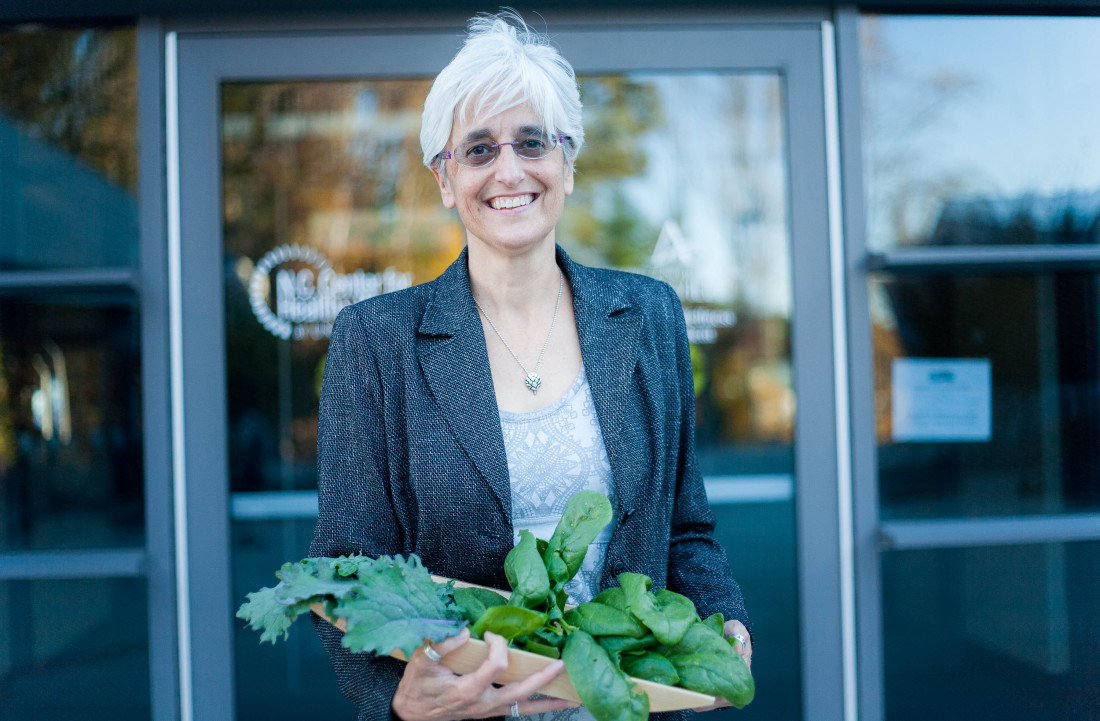Nutrition experts from across the country are gathering in Asheville Friday-Sunday, Nov. 14-16, for the inaugural Plant-based Prevention of Disease Conference.
One of the reasons the conference is being held in Asheville is that our local restaurants are already modeling “how alternative dietary patterns and eating styles can be made accessible to a broad population,” says Amy Lanou, chair of UNC Asheville’s health and wellness department, which is hosting the event. She notes that Asheville is already home to the country’s premier all-vegan restaurant, Plant, and all-vegetarian restaurant, Laughing Seed.
“Even our little taco places are paying attention to providing healthy foods that can meet the needs of everybody, from people who are eating zero animal products to more general omnivorous diets,” Lanou says.
She’s especially inspired by the interest of the local hospital systems in introducing a plant-based dietary pattern into disease management and disease prevention cases. Although the conference is open to the public, Lanou says, it initially grew “out of a real desire to help medical professionals really understand the potential power of helping their clients shift to more plant-based eating styles.” Continuing education credits will be available for health care professionals who attend the conference, she mentions.
Rethinking the food pyramid
This year, the N.C. Dietetics Conference is also happening in Asheville, bringing many clinical dietitians from across the state to the area. According to Lanou, conference founder (and speaker) Bob LeRoy views the event as an opportunity to share plant-based approaches to prevention of disease with clinical dietitians who are currently working with clients in a health care environment.
In this case, creating awareness around plant-based eating styles begins with educating the practitioners who prescribe care. Lanou says that organizers hope to “bring people with more of a traditional approach [to the use of nutrition in disease prevention] on board.”
In a field that has generally used the food pyramid and ChooseMyPlate guidelines as a standard, the P-POD conference will offer “a look into a dietary pattern that is much less reliant and sometimes completely devoid of food from animal sources,” says Lanou. While a traditional dietetics practice tends to focus on overall balance and variety, viewing meat as a standard protein source and milk as a good calcium source, she says, the conference will promote a complete plant-based strategy for health.
Workshops cover an array of research on plant-based prevention for chronic diseases such as diabetes and heart disease as well as bone health and cancer.
Dialing in on diabetes
The Friday session is specifically focused on treating diabetes with a plant-based dietary pattern. Diabetes is a featured topic because there are “a lot of clinical dietitians and health care professionals working with people who have diabetes,” says Lanou. “It is one of the few chronic conditions for which there is health insurance coverage to see a nutritionist.”
Unique to this conference is that the people on the forefront of nutrition and diabetes research will be present. “There is fairly new research, in the last 10 years, that suggests better long-term benefits in using very high-carbohydrate, whole-food, low-fat, plant-based diets to manage and reverse Type II diabetes,” says Lanou,” and “the people doing this research will be there.”
Eating better
“We want to better define what ‘eating better’ means,” says Lanou. In this case, adopting a particular eating style is not necessarily the cure-all for lasting health. “French fries, Twizzlers and pasta are all vegan,” says Lanou.
“The advocacy is for whole foods that are close to their original form and full of nutrients,” she explains. “When I talk about high-processed foods to my students, I say, ‘If you can’t see the original form of the food you are eating, then it is probably highly processed.'”
As part of the conference, UNCA students will learn how to prepare and cook healthy meals with chef Bill Najger, who will be creating vegan and gluten-free meals for the conference. Lanou says that if anyone is unable to afford the conference, there are many volunteer opportunities available as a trade for session attendance.
After it’s all said and done, her ideal “would be to see plant-based eating styles being offered as options to people in the medical and allied health systems, as a part of their healing or disease management or disease prevention.” She pauses and laughs at what she has just said, adding: “That might be big for one conference.”
WHAT: Plant-based Prevention of Disease Conference — “a collaboration of nonprofits without commercial funding; continuing education for health professionals, students and the public about reducing major disease risks via plant-based nutrition,” with presentations by 19 distinguished researchers, clinicians and educators. Hosted by UNC Asheville’s department of health and wellness.
WHEN: Friday-Sunday, Nov. 14-16
WHERE: UNC Asheville
REGISTRATION: preventionofdisease.org




Before you comment
The comments section is here to provide a platform for civil dialogue on the issues we face together as a local community. Xpress is committed to offering this platform for all voices, but when the tone of the discussion gets nasty or strays off topic, we believe many people choose not to participate. Xpress editors are determined to moderate comments to ensure a constructive interchange is maintained. All comments judged not to be in keeping with the spirit of civil discourse will be removed and repeat violators will be banned. See here for our terms of service. Thank you for being part of this effort to promote respectful discussion.